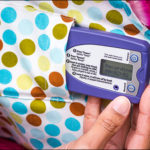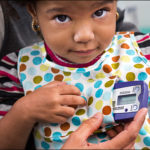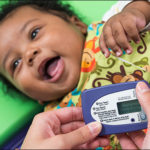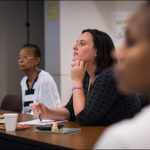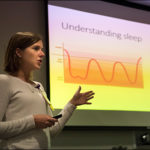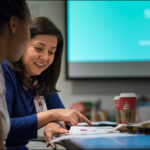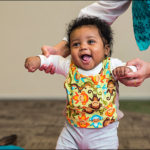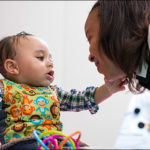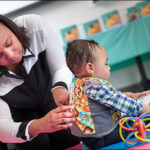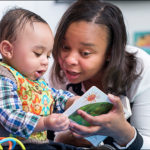Almost a year after the launch of a program geared toward improving a baby’s language skills, parents are singing its praises, saying upWORDS has helped their children as well as themselves.
“It definitely met my expectations and beyond,” said Fylasan Hanible, whose son, Donnell David Price IV was 7 months old when he and his mother went through the program. “I didn’t know that I could increase it (language) as much as I have.”
Alexandrina Gonzalez agreed and said her 22-month-old daughter’s language skills have improved greatly as a result of upWORDS and that the program is something every parent can benefit from.
“upWORDS taught me about things I didn’t realize could help,” Gonzalez said. “As a result, everyone in my family has benefited.”
Click here to view photos from the first upWORDS class.
Developed in association with the LENA Research Foundation, the upWORDS program at Texas Children’s Hospital was launched last summer as a pilot program at Texas Children’s Hospital West Campus. Since then, 20 families have completed the four-month course and another 38 are currently enrolled in classes starting this month and in June and September at West Campus and the Cy-Fair Health Center.
Available in both English and Spanish, the upWORDS program includes group classes where parents learn to use the LENA System™ to monitor their home language environment and are taught simple techniques to increase interactive talk with their child.
To measure a participant’s home language environment, the LENA System™ uses a small recorder that fits inside a vest worn by the child. The recorder measures the amount of words a family speaks to their child and how much their child responds in return. The recording is then translated into data that the parents can use to gauge how much they are talking to their child and identify opportunities to increase the level of spoken interaction they have with their baby.
At Texas Children’s, parents receive individual coaching in addition to the group classes to discuss their data results, gain the best results possible and to work through any additional obstacles that could potentially hinder their child’s development.
Dr. Christopher Greeley, chief of the Section of Public Health Pediatrics at Texas Children’s, said the initial response to the program has been impressive and shows an appetite for a program like upWORDS, which focuses on a child’s early language development.
“We conventionally think of worrying about language skills and children at 2 and 3 years of age, when they’re starting to read and learning their A,B,Cs,” Greeley said. “But the data are clear that babies, even young babies, are mindful of language and mindful of verbal and non-verbal communication even in the first few months of life.”
By the age of 3, 80 percent of a child’s brain development is complete. These first few years of a child’s life are therefore critical and provide the greatest opportunity to influence their success later in life.
Research shows that many children are exposed to nearly 30 million fewer words than their peers by the time they reach 3 years old. The upWORDS program helps parents of infants and toddlers (0 to 6 months for the pilot program) close the “talk gap” by teaching them how to talk and interact more with their babies to increase brain development and positively impact their child’s future.
To learn more about, or register for, the upWORDS program at Texas Children’s, click here.


